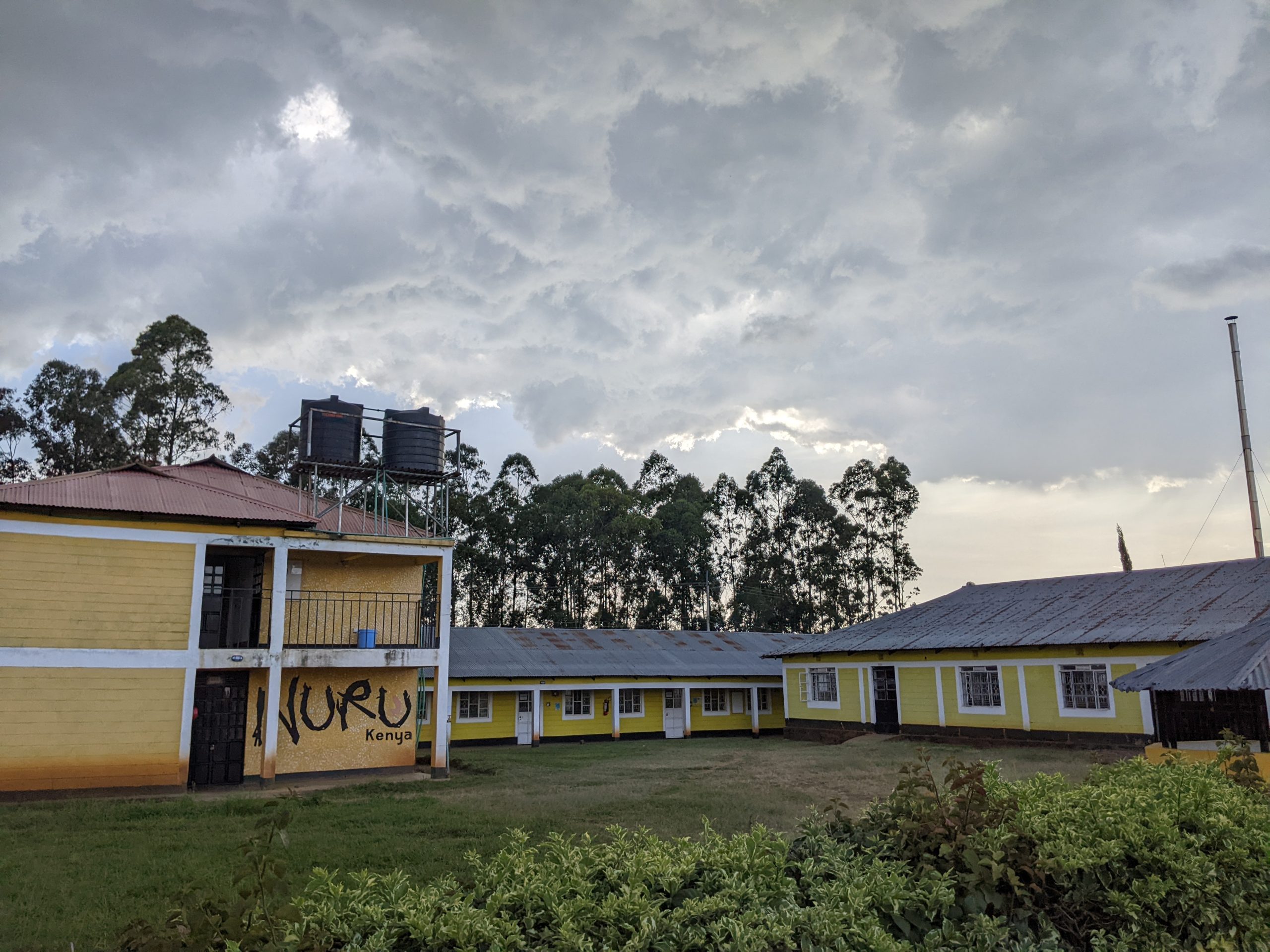The Nuru Feed Mill, located within the Nuru warehouse in Isebania, Kenya, stands as a testament to Nuru Kenya’s spirit of innovation and dedication to increasing sustainability.
The Nuru Feed Mill was established to address a pressing need. Local farmers in Migori County and surrounding regions were grappling with the challenge of accessing affordable, high-quality livestock feeds. The nearest sources were located far from their communities, resulting in high prices and logistical complications.
Dairy Meal: A Crucial Resource for Dairy Farmers
Nutritious concentrates like dairy meal are imperative for high milk yields and healthy cows; therefore, ensuring the quality of feed is paramount for achieving optimal yields consistently. Prior to the establishment of the feed mill, farmers in the region faced considerable challenges. Reliance on the unpredictable market for feed resulted in fluctuating prices and inconsistent feed quality, posing a significant hindrance to farmers’ ability to maintain healthy and productive dairy cows.
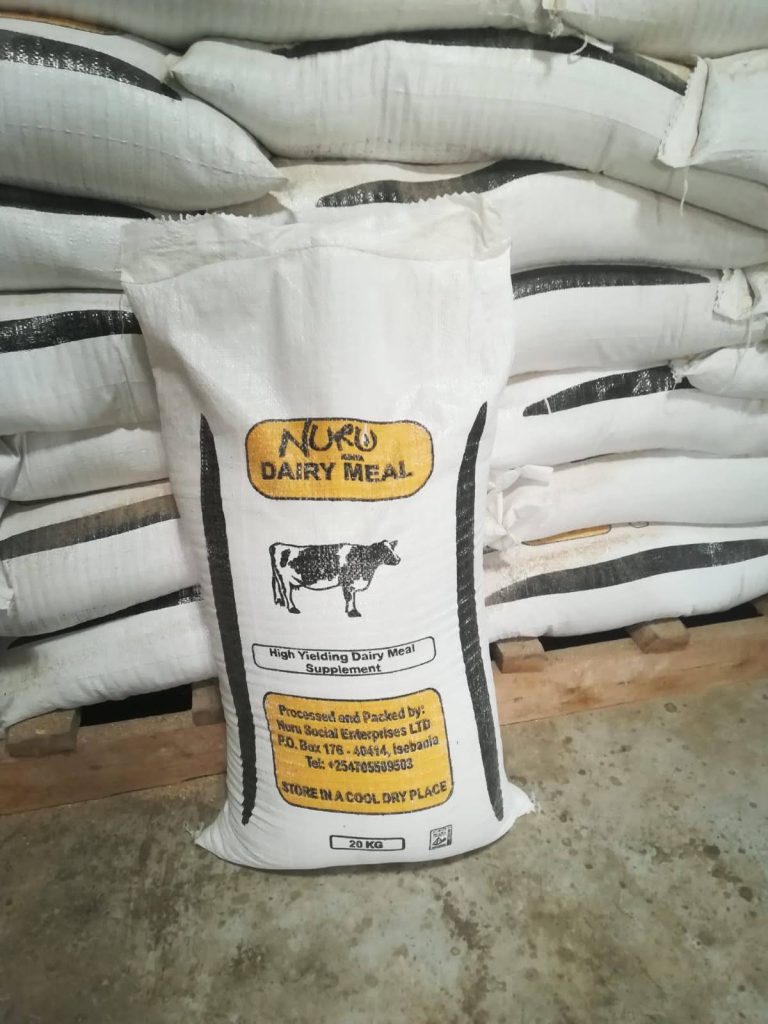
Nuru Kenya Dairy Meal, 2023
The feed mill is capable of compounding eight tons of feed per day. While the mill is currently focused on dairy meals for lactating cows, in the future, its versatility will allow it to produce various feeds for different livestock, including poultry, pigs, calves, and growing dairy heifers.
A Reliable Market for Local Farmers
Beyond its role in feed production, the feed mill also operates as an off-taker for local farmers. By purchasing raw materials like sunflower, soya, and maize (corn) from farmers through cooperatives, Nuru Kenya ensures a diverse range of high-quality feeds, supports local agriculture, and provides a reliable market for farmers. This serves as an added benefit to the farming community, contributing directly to their economic stability and sustainability. The feed mill is also equipped to adapt its production methods as needed to meet the varying demands of the local market or to accommodate changes in the availability or types of raw materials purchased from the farmers.
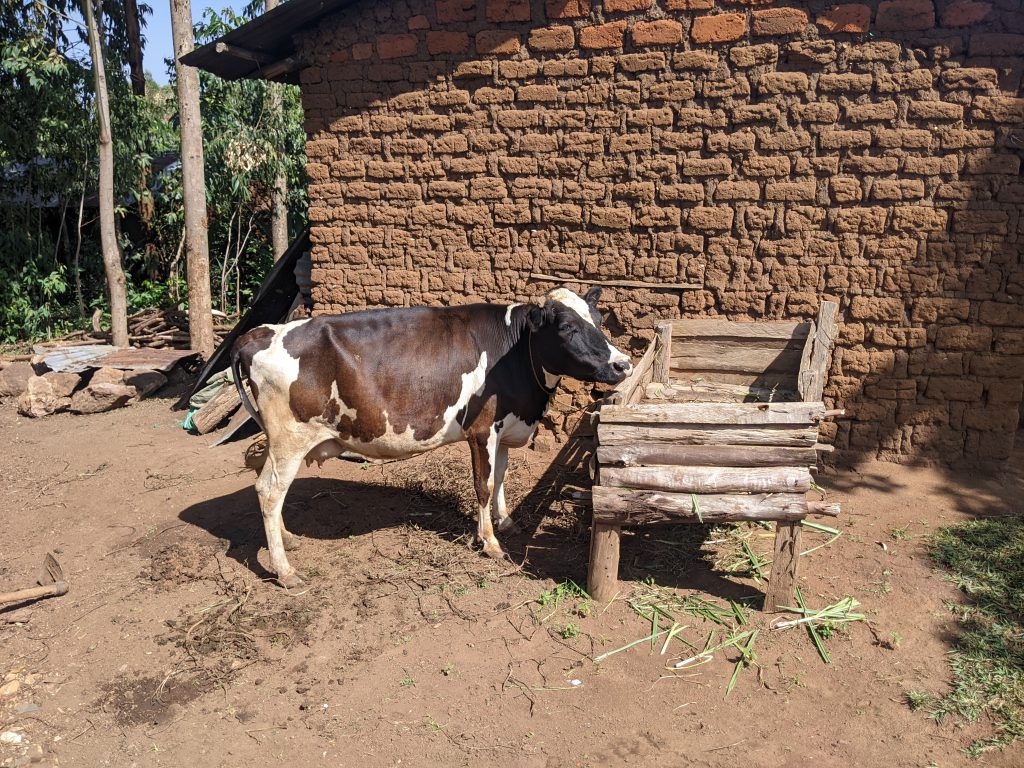
A dairy cow owned by a Nuru Kenya farmer stands at a feeding trough, 2023
Nuru Kenya’s persistence and commitment are gradually shifting mindsets in the region as the feed mill clearly demonstrates the value it brings to local farmers. The introduction of the Nuru Feed Mill has not only ensured that farmers can access feed at a lower cost, but it also paved the way for more resilient and productive farming. As farmers consistently use high-quality feed, yields from dairy cows increase and the overall health of the dairy cows improve.
Dedication to Quality
The Nuru Feed Mill stands out due to its unwavering commitment to quality assurance. The feed mill ensures the consistency of the finished dairy meal by subjecting batches to analysis at reputable labs in Nairobi, along with stringent raw material checks for aflatoxin levels. Additionally, the feed mill operators are highly skilled, receiving regular refresher training to stay updated on the latest developments in the industry. Local farmers have received training on the feed mill’s benefits, and valuable feedback has been collected from the farmers and incorporated into the operational processes.
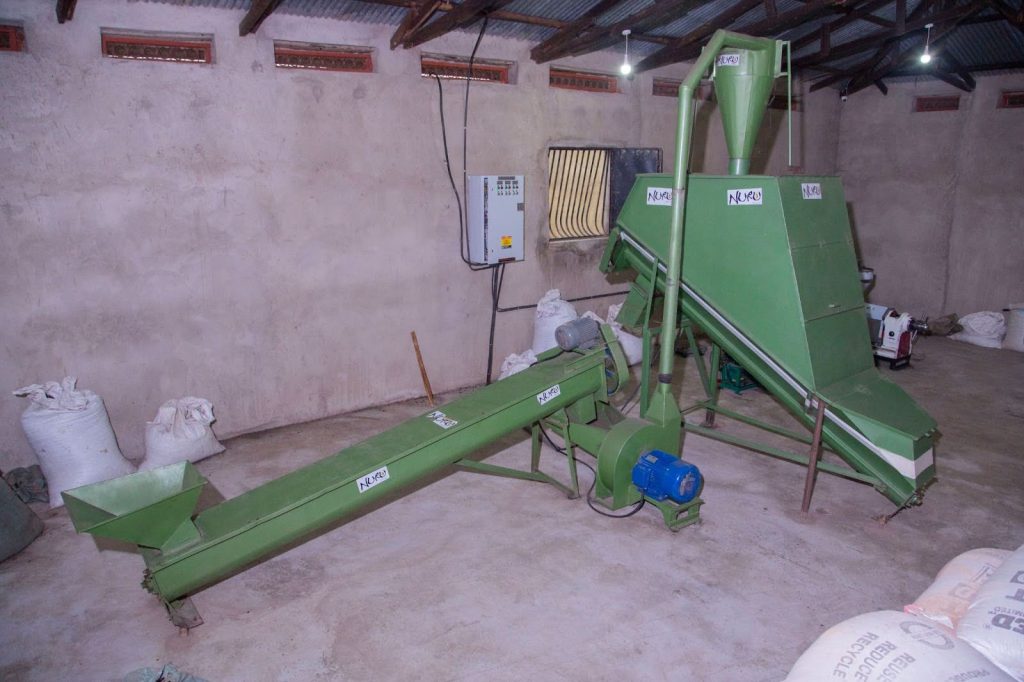
Nuru Kenya Feed Mill processing equipment, 2023
The Nuru Feed Mill has made significant progress since its inception. The feed mill has obtained the Kenya Bureau of Standards (KEBS) certification, guaranteeing compliance with the national dairy meal standards. KEBS certification has been a crucial milestone, endorsing the feed mill’s quality and ensuring customers have recourse in case of complaints. Furthermore, this certification has been valuable in building trust with the local farmers.
Mariganga Cooperative Farmer : Dorika Matinde Warioba
Dorika Matinde Warioba, a dedicated member of the Mariganga Cooperative, joined the cooperative in 2016. Her story, deeply intertwined with the impact of the Nuru Feed Mill, is a testament of the impact of high-quality feed accessibility for dairy farmers like Dorika.
In 2020, after receiving a heifer on loan through her Nuru-supported cooperative, Dorika decided to purchase dairy meals from the Nuru Feed Mill. Dorika’s heifer received artificial insemination (AI) services for her cow through Nuru Kenya. And when the heifer calved in 2022, Dorika reached a significant milestone in her dairy farming journey.
Previously, Dorika purchased dairy meals from other vendors, which proved to be quite expensive due to their reliance on distant sources for feed. Recognizing the need for a more cost-effective and reliable source of feed to support her cows, Dorika transitioned to purchasing from the Nuru Feed Mill. The shift to Nuru Feed Mill’s products had a profound impact on her dairy operation, as her cows’ health improved significantly, and dairy cow milk production increased. Her daily yield increased from 2 liters to 7 liters, which she was able to sell for consistent income. This newfound financial stability allowed Dorika to afford essential household necessities and support her children’s education, leading to an overall improvement in the well-being of every member of her family.
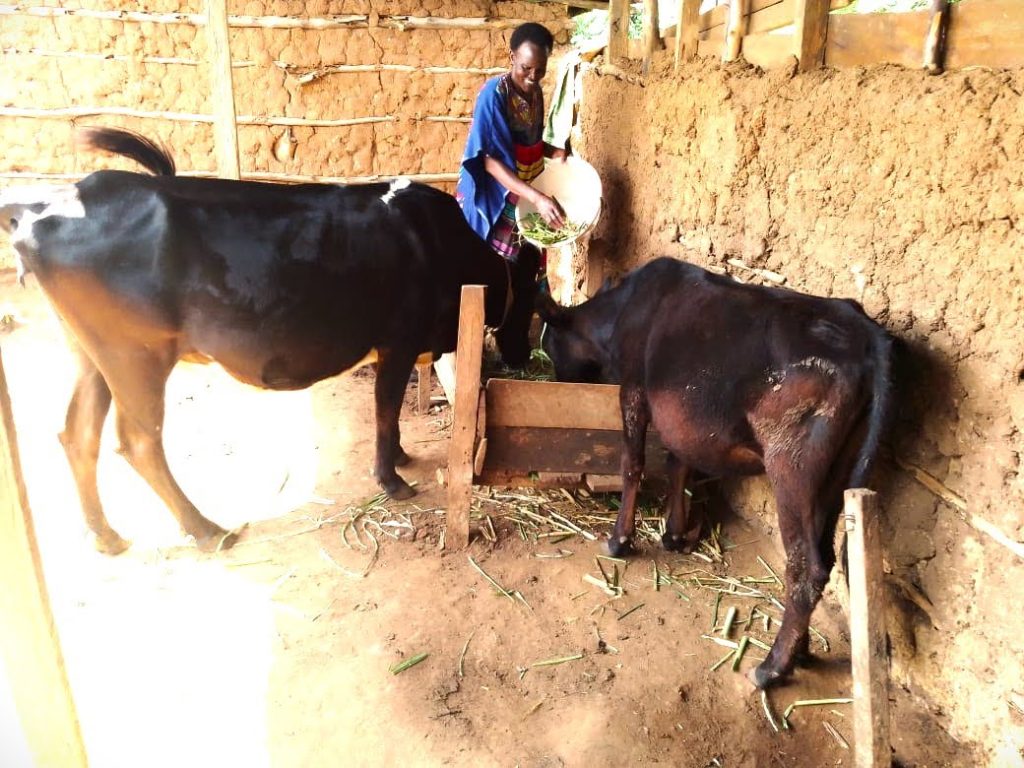
Dorika feeding her dairy cows, 2023
Dorika’s story epitomizes the transformative potential of initiatives like the Nuru Feed Mill. By providing consistent access to high-quality feed, the feed mill has not only improved the health and productivity of local farmers’ cows, but it has also had a ripple effect throughout farmer households and cooperatives. Dorika envisions a future where her cows continue to thrive and provide her with the means to buy more cows, thus growing her business. This expansion can equip Dorika to continue improving her family’s well being, as she increases her income, establishes financial savings, and is equipped to plan for the future.
A Vision for the Future
The Nuru Feed Mill’s journey is far from over. In the future, the business intends to expand to offer a broader range of livestock feeds, addressing the diverse needs of farmers in the region. Moreover, the feed mill aims to encourage farmers to cultivate the raw materials. These crops can be purchased by the feed mill through the cooperatives, providing farmers with an additional revenue stream, while promoting sustainable agricultural practices. This will reinforce the feed mill’s commitment to a more ecologically responsible and economically viable farming future. By promoting local raw material cultivation, the mill reduces dependency on external suppliers, enhancing self-sufficiency and resilience.
The feed mill’s focus on quality and sustainability paves the way for a more prosperous and resilient agricultural landscape, as it acts as a higher production alternative to traditional feeding practices. By providing consistent access to high-quality feed, the feed mill has the potential to transform existing agricultural practices and increase resilience in the farming community. The availability of diverse feed options encourages tailored nutrition and more efficient practices.


